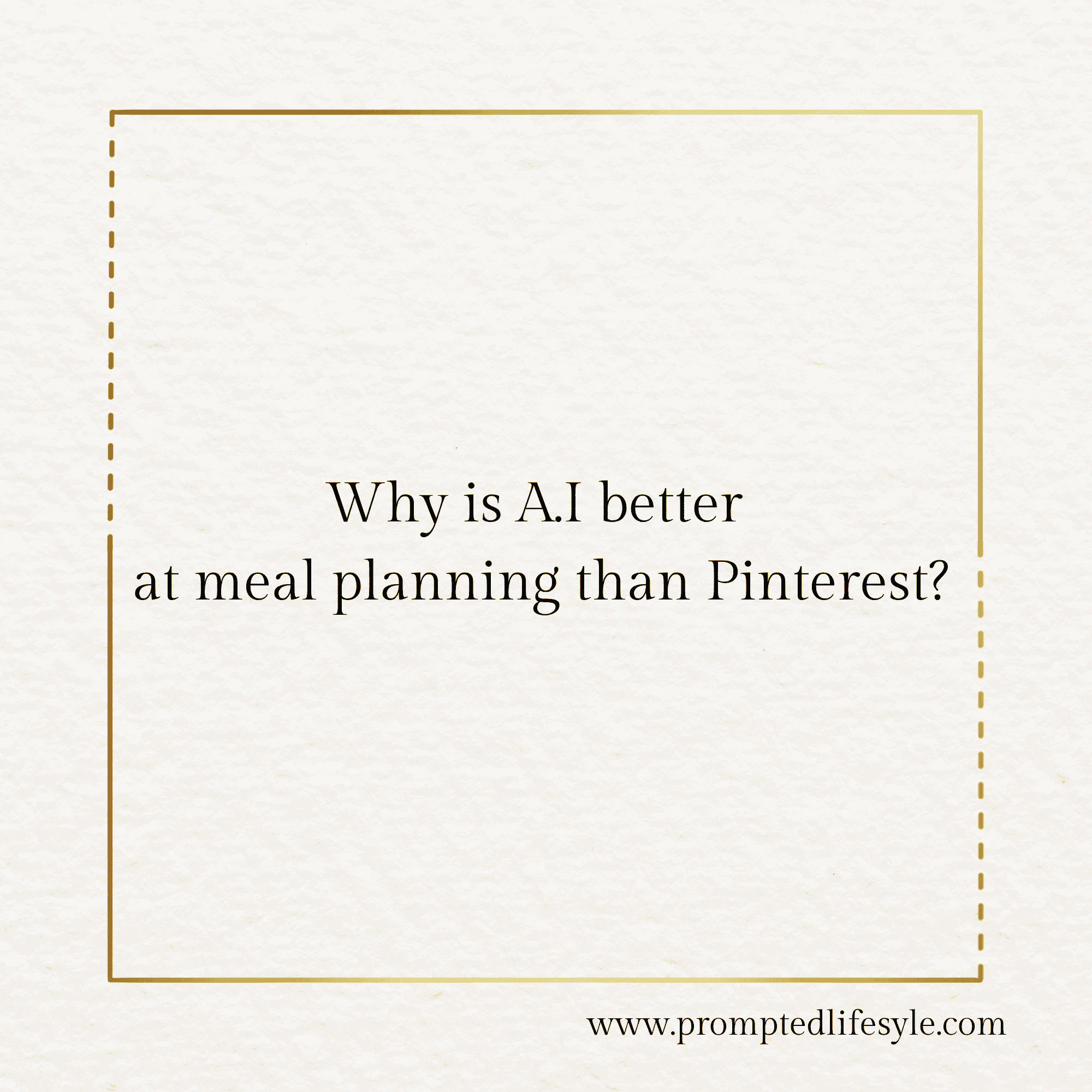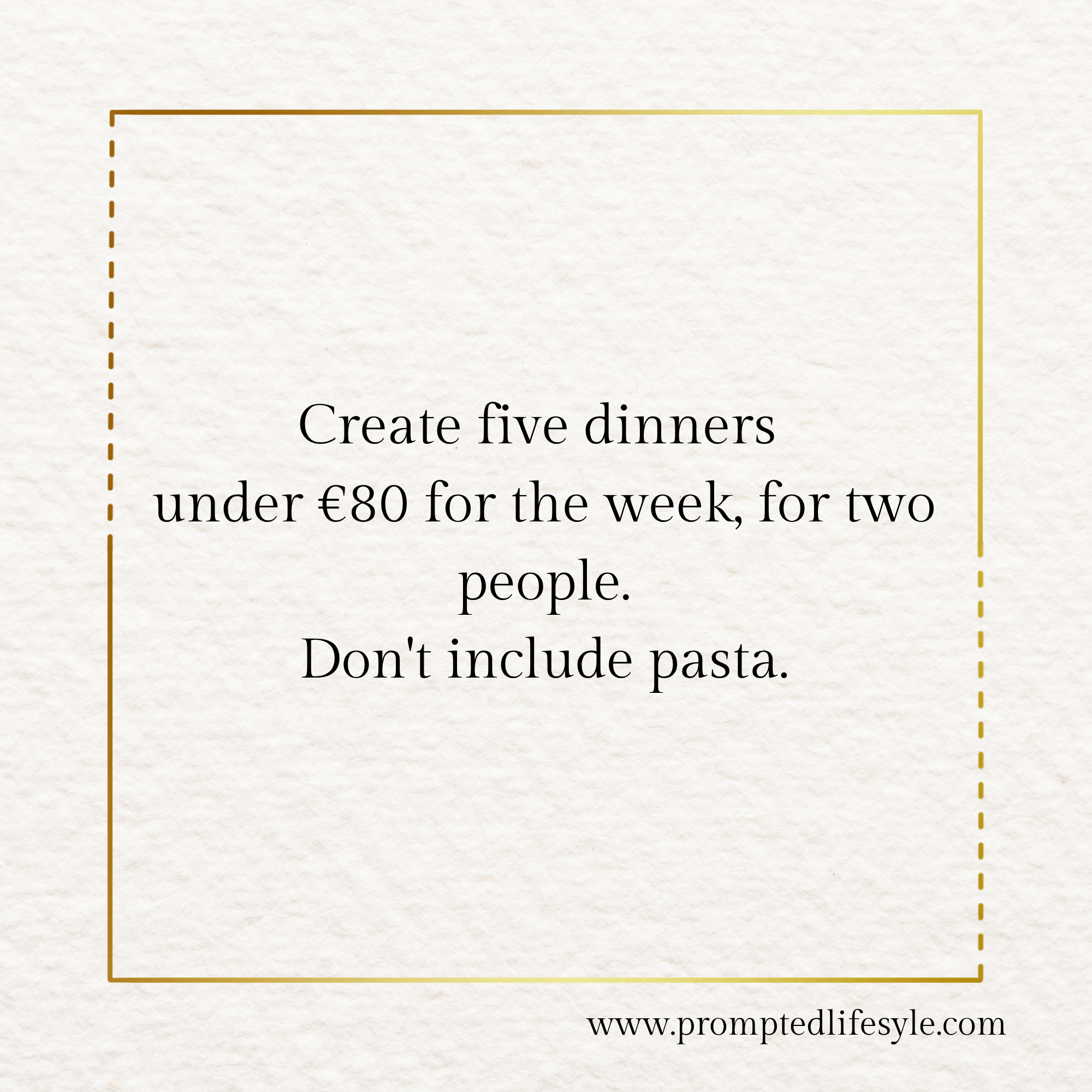Why AI Beats Pinterest for Meal Planning (And How to Actually Use It Without the Stress)
Why Pinterest Overwhelms Us with Meal Planning
I don’t know about you, but I’ve spent way too many evenings scrolling Pinterest with a glass of wine in hand, convinced I’d find the “perfect” recipe that would fix my dinner struggles. And sure, I’d pin a dozen gorgeous meals — colorful buddha bowls, 30-minute sheet pan dinners, some magical one-pot pasta. But when it came time to actually cook? Half the recipes called for ingredients I didn’t have, or they just didn’t feel realistic after a long day.
Pinterest is amazing for inspiration, but when it comes to practical weekly meal planning, it often makes things harder. Too many choices. Too many “idealized” recipes. Not enough structure.
That’s where AI meal planning changes the game.
Why AI Is Better Than Pinterest for Meal Planning
1. AI saves you from decision fatigue
With Pinterest, you’re the one doing all the filtering. With AI, you just say what you need (“three vegetarian dinners under 30 minutes with budget-friendly ingredients”) and boom — you’ve got a usable plan. No endless scrolling.
2. AI tailors plans to your actual life
Pinterest doesn’t know your kids hate mushrooms, or that you’re on a budget this month, or that you only have 20 minutes between soccer practice and bedtime. AI can adapt instantly to your real-life constraints.
3. AI reduces food waste
A big problem with Pinterest recipes is they rarely align with each other — so you end up buying random ingredients. AI can build meal plans where ingredients overlap, saving you money and reducing waste.
Pinterest can be inspiring, but AI is practical. In my post on AI meal planning, I show how to turn your favorite recipes into a smart, stress-free weekly plan.
4. AI keeps things simple
Pinterest can make you feel like every dinner should be Instagram-worthy. But AI can keep it simple, suggesting realistic, tasty meals that don’t require 15 steps or a spiralizer you don’t own.
5. AI helps you actually follow through
It’s one thing to pin a recipe. It’s another to have a structured meal plan with a grocery list, prep tips, and reminders. AI makes the follow-through part easy.
If you want a simple place to start, my Effortless Meal Planning Guide walks through how to use AI to plan dinners, build grocery lists, and cut down on weeknight stress. It’s practical, quick to follow, and fits right into a busy routine.
My Own “Pinterest vs. AI” Moment
I’ll be honest: I once planned a whole week of dinners from Pinterest boards. It looked amazing on Sunday night. By Wednesday, though, I had wilted kale in the fridge, a half-used can of coconut milk, and no energy left to whip up that fancy pad thai. We ended up ordering takeout.
When I tried AI for meal planning instead, I asked it to create five dinners under €80 for the week, using chicken, beans, and seasonal vegetables I already had. The difference? Everything was practical, the grocery list made sense, and we actually ate what I planned. That week, no food waste, no takeout. Just calm.
How Does This Connect to a Healthier Lifestyle Overall?
Here’s where it gets exciting: once you start with breaks, you’ll realize AI can support you in other lifestyle areas too.
Healthy eating: Use AI prompts for meal planning with simple, budget-friendly recipes (link internally to your meal planning blog).
Mindful evenings: AI can suggest calming bedtime routines instead of late-night scrolling.
Emotional check-ins: Ask AI to guide short journaling prompts when you’re overwhelmed.
Little by little, those “tiny reminders” stack into healthier routines that feel natural instead of forced.
How Does This Connect to a Healthier Lifestyle Overall?
Here’s where it gets exciting: once you start with breaks, you’ll realize AI can support you in other lifestyle areas too.
Healthy eating: Use AI prompts for meal planning with simple, budget-friendly recipes (link internally to your meal planning blog).
Mindful evenings: AI can suggest calming bedtime routines instead of late-night scrolling.
Emotional check-ins: Ask AI to guide short journaling prompts when you’re overwhelmed.
Little by little, those “tiny reminders” stack into healthier routines that feel natural instead of forced.
FAQ
Q: Isn’t Pinterest still useful for meal planning?
Yes, Pinterest is fantastic for inspiration — like a virtual mood board of beautiful meals. But the challenge is that Pinterest is mostly visual and aspirational. It doesn’t know your schedule, your budget, your pantry, or your family’s likes and dislikes.
Take me, for example. I once spent an entire weekend pinning “perfect” recipes, dreaming of Instagram-worthy dinners. By Wednesday, I had wilted kale, half a can of coconut milk, and no energy to cook. That’s when I tried AI: I typed, “Plan five dinners this week using chicken, beans, and seasonal veggies under €50, with prep under 30 minutes.” Within seconds, I had a plan I could actually follow. No overwhelm, no wasted food, just practical meals. Pinterest is dreaming; AI is doing.
Q: Can AI meal plans really save money?
Absolutely! AI helps you reduce food waste and stick to your budget. For example, my friend Sara, a college student, had a €60/week limit. Pinterest recipes looked amazing but were expensive. She asked AI: “Create a 7-day dinner plan under €60 using Aldi ingredients with simple prep steps.” The AI suggested lentil tacos, chickpea curry, and veggie stir-fry. She saved almost €20 and actually enjoyed cooking because the meals were simple and realistic. AI turns inspiration into savings.
Q: Do I need to be “techy” to use AI for meal planning?
Not at all! Most AI tools just need plain language. You can type something like: “Plan three easy dinners with chicken, carrots, and avocado for my family of four, under €70 for the week.” AI will give you the meals, grocery list, and prep instructions. The hardest part is learning what to ask — which is why ready-made prompts from this blog are perfect.
One personal tip: start small. Try planning just one week first. When I did this, it felt like having a personal assistant who understood my fridge, my kids’ preferences, and my limited time.
Q: Can AI adjust if my family has allergies or special diets?
Yes! AI can handle multiple restrictions at once. For instance, my friend with picky eaters typed: “Plan 4 kid-friendly dinners with hidden vegetables, no mushrooms or bell peppers, under 25 minutes.” The AI suggested cheesy veggie pasta, taco bowls with shredded zucchini hidden in the meat, and sweet potato nuggets. Her kids ate every meal without complaint. Pinterest never gave her that level of personalization.
Q: How accurate are AI meal plans? Can I trust them?
AI is very accurate if you give clear instructions. It can provide proper portions, prep times, and grocery lists. That said, it’s always wise to double-check if you have dietary or medical concerns. Think of AI as a smart kitchen assistant: it does the heavy lifting, but you’re still the one cooking.
Q: Will AI make cooking boring or repetitive?
Not at all! AI actually increases variety while keeping things simple. For instance, during a crazy work week, I asked AI: “Plan 5 dinners under 20 minutes using chicken, beans, and frozen vegetables.” I got one-pot chicken and veggie skillet, bean quesadillas, and microwave-friendly pasta dishes. No repetition, no stress, just quick, varied meals.
Q: How do I start using AI for meal planning without feeling overwhelmed?
Start small. Try one week, use a ready-made prompt from this blog, and tweak if needed. The goal is practicality, not perfection. AI meets you where you are, whether that’s a budget, picky kids, or a busy schedule.
For example, I once used AI for a “zero waste week” — it created meals using the leftover spinach, sweet potatoes, and chickpeas in my fridge. I was amazed at how creative, easy, and doable it was. Starting with a small experiment gives you confidence and makes meal planning feel less like a chore and more like a gentle, joyful routine.
Free Resource: High-Value AI Prompts for Meal Planning
Here are some detailed prompts you can copy-paste straight into ChatGPT or another AI tool. I designed these to be practical and real-life tested — not just generic.
Family Budget Planner:
"Create a 5-day family dinner meal plan for 2 adults and 2 kids, under €90 total. Include a grocery list with quantities, make sure ingredients overlap across meals to reduce waste, and keep prep time under 30 minutes per meal."Picky Eaters Fix:
"Plan 4 kid-friendly dinners with no mushrooms or spicy foods. Each meal should have a hidden vegetable option, take less than 25 minutes, and be easy for a tired parent to cook on a weeknight."Vegetarian Meal Prep:
"Generate a 3-day vegetarian meal prep plan with 2 main dishes and 2 side dishes. Use seasonal vegetables available in autumn in Europe. Provide reheating instructions for storing in the fridge."Health Goals:
"Make a 7-day dinner plan for someone trying to lower cholesterol. Meals should be Mediterranean-style, under 500 calories per serving, with simple cooking steps and a complete grocery list."Slow Cooker Savior:
"Give me 5 slow cooker dinner recipes that use chicken, beans, or lentils. Ingredients must be pantry-friendly, with prep under 15 minutes. Provide serving suggestions for leftovers."Zero Waste Challenge:
"Plan 4 dinners using up these ingredients: half a bag of spinach, 3 sweet potatoes, a can of chickpeas, and feta cheese. Add any other simple ingredients as needed. Include step-by-step cooking instructions."Grocery Budget Reset:
"Create a 1-week meal plan for dinners under €70 using Aldi or Lidl ingredients. List approximate costs and organize the grocery list by store sections."
Final Thoughts
Meal planning doesn’t have to feel like a second job. Pinterest gives us ideas, but AI gives us structure, saves us money, and reduces stress. The beauty of AI is that it adapts to your life instead of asking you to adapt to it.
If you’ve ever felt stuck staring at your fridge wondering what to make, or guilty about wasting food after trying (and failing) a Pinterest-perfect plan, I promise — AI can make this easier.
Start small. Try one of the prompts above this week and see how it feels. You might just find that meal planning becomes less about stress and more about care: care for yourself, your family, and your time.
Because at the end of the day, dinner isn’t about perfection — it’s about connection. And if AI can help you create more space for that, why not give it a try?




